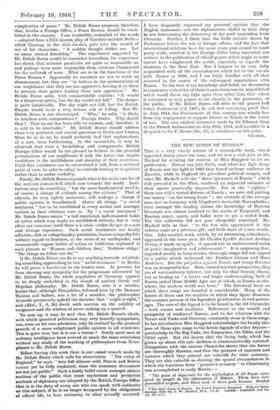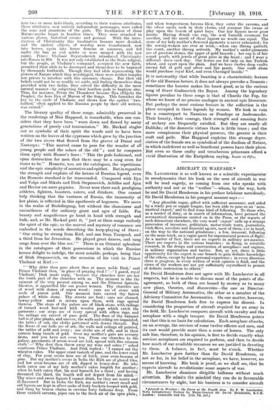THE EPIC SONGS OF RUSSIA.* Tins is a very timely
reissue of a remarkable hook, which appeared thirty years too soon, and we owe a real debt to Mr.
Mackail for securing the consent of Miss Hapgood to its re- publication. Habent sva fats libelli, and when her Epic Songs of Russia saw the light in 1885 they found no large audience in America, while in England 'the prevalent political temper, and 'what Mr. Mackail calls the " dense ignorance of Russia " which 'still prevailed in the West, rendered an impartial estimate of
their merits practically impossible. For in the " eighties " there was still' a rooted distrust of Russia ; we were still putting our money " on the wrong horse " ; the attitude of the average man was in harmony with Urquhart's.invincible Russophobia ; even amongst the reading classes the knowledge of Russian literature was almost confined to the works of Turgenieff, and Russian music, opera, and ballet were as 'yet a sealed book. Yet this collection did not pass altogether unnoticed. Mr.
Mackail tells us that " to the few who appreciated it the volume came as a precious gift, and little short of a new revela- tion. Like another work, which, by an interesting coincidence,
appeared in the' same year, Sir Charles Lyall's Ancient Arabian Poetry, it made sn epoch ; it opened out an undiscovered realm of poetic imagination and achievement." It is surprising that,
regarded merely as fairy-stories, these epic songs did not appeal to a public which welcomed the Brothers Grimm and Hans Andersen. But the prejudice against Russia and things Russian was an insuperable bar. Now, viewed in a truer perspective, they are of extraordinary interest, not only for their literary charm, but as leading to " a better and larger understanding, both of Russia and of those Middle Ages out of which, in Russia as else- 'where, the modern world was born." The historical basis on '-which these songs are founded is considerable. Many, of the heroes, of them and the exploits in which they _figure illustrate
the common process of the legendary glorification of real-person- ages. The core of the legend is to be found in the old Chronicles
i—both names and incidents. References to the wealth and prosperity of mediaeval Russia, and to her relations with the -Tatars and Turks- and Saracens, constantly recur in these songs.
/n.her introduction Miss Hapgood acknowledges the family like- ,uses of those epio.songs to the heroic legends of other Aryans— %particularly to the Rig-Veda, the Ramayana, the Edda, and the
Caltie epics. But she insists' that 'the living body- which has grown up about this epic skeleton is characteristically national. -comparison. with the ancient .Chronicles shows that the heroes are thoroughly Russian,' and 'that the pictures of manners and 'customs which they present are valuable for their accuracy. They are also valuable as showing the special circumstances in :which the transition from "primitive animism " to Christianity was accomplished -early Russia :- " The point of departure for the mythologies of • all Aryan rum :must. be• sought in the phenomena :of Nature; These were first personified as gods, and -when each of these gods became divided " • The iota Songs of Russirt. By 'babel Florence Hapgood. wftwan rem- "duetere N040`,by 1. 'W. Mackall, ILA., LL.D. X.011440 CdoStabte and Db.
14e. 434. net.] into two or more individuals, according to their various attributes, these attributes, now entirely independent personages, were called the sons and grandsons of the gods. The localization of these Nature-myths began in heathen times. They were attached to various places, historical events and persons With the intro- duction of Christianity this localization became more decided, and the ancient objects of worship were transformed, now into heroes, again into house demons or sorcerers, and fell under the ban as evil spirits or were merged with the now saints. Prince Vladimir Svyatoslavich introduced Christianity into Russia in 988. It was not only established as the State religion, but the people, at Vladimir's command, accepted the new faith, permitted their idols to be destroyed and themselves to be baptized by thousands forthwith. Though they had idols representing the powers of Nature which they worshipped, there were neither temples nor priests to interfere with this summary change. But their old beliefs could not be so readily set aside, and finding themselves thus provided with two faiths, they solved the difficulty in the most natural manner—by subjecting their heathen gods to baptism also. Thus, for instance, Perun the Thunderer became Ilya (Elijah) the Prophet, the hero Ilya of Murom of the Songs. This furnishes the key to the cycle of Vladimir, and shows how the epithet two- faithed,' often applied to the Russian people by their old writers, was earned."
The literary quality of these songs, admirably preserved in the renderings of Miss Hapgood, is remarkable, when one con- siders that they have been " worn down and flawed by many generations of purely cral transmission." Mr. Mackail singles out as symbolic of their spirit the words said to have been written on the leaves of the cypresses which grew by the junction of the two rivers that flowed from the graves of Duna! and Nastasya: "This marvel, came to pass for the wonder of all young people and the solace of the old " ; and he compares them aptly with Homer's lines : " This the gods fashioned, and spun destruction for men that there may be a song even for times to be." Homeric, too, are the catalogues, the repetitions, and the epic simplicity of narrative and epithet. But in regard to the strength and exploits of the heroes of Russian legend, even the Homeric standard is far transcended. Compared with Ilya and Volga and Mikula and Diuk Stepanovich, Achilles and Ajax and Hector are mere pygmies. Never were there such prodigious athletes, fighters, boasters, eaters, and drinkers. One cannot help thinking that the vastness of Russia, the immensity of her plains, is reflected in this apotheosis of hugeness. We move in the realm of Brobdingnag, but without the clumsiness and uncouthness of the ordinary giant and ogre of fable. For beauty and magnificence go hand in hand with strength and bulk, and, as Mr. Maekail puts it, " just as these songs embody the spirit of the epic, so the marvel and mystery of romance are embodied in the words describing the harp-playing of Stavr : " One string he strung from Kief, and one from Tzargrad, and a third from far Jerusalem. He played great dances, and sang songs from over the blue sea.' " There is an Oriental splendour in the catalogues of their possessions in which the Russian heroes delight to indulge, the most notable, perhaps, being that of Diuk Stepanovich, on the occasion of his visit to Prince Vladimir at Kief :- " ` Why didst thou gaze about thee at mass, noble Diuk,' said Prince Vladimir then, in place of praying God ? I gazed, royal Vladimir,' Diuk made reply, because thy churches here are not the tenth part of the churches with us. Thy raiment is like the raiment of the very poorest among us, and the Princess Apraxia, likewise, is apparelled like our poorer women. Thy churches are of wood with domes of aspen wood : ours are of stone with roofs of purest gold. Our meanest huts exceed thy fairest palace of white stone. Thy streets are foul : ours are cleaned, tawny-yellow sand is strewn upon them, with rugs spread thereon. The steps of thy palace are of black atone, with railings of turned wood fastened with wooden pegs which catch the garments : our steps are of ivory spread with silken rugs, and the railings are carved of pure gold. The floor of thy banquet hall is of pine planks, and uneven, the walls and ceiling are unpainted, the tables of oak, the cloths patterned with drawn threads. But the floors of our halls are of ash, the walls and ceilings all painted, the tables of gold and ivory ; our cloths are of silk, and at their corners hang tassels of gold. Over my mother's gate are seventy ikons, and you have not even ten. From our churches to the palace, pavements of arrow-wood are laid, spread with fine crimson cloth:— Why dost thou throw away my wine and cakes ? ' asked courteous Prince Vladimir. And Pink replied : I cannot eat thy wheaten cakes. The upper crust tasteth of pine, and the lower crust of clay. For your ovens here are of brick, your oven-brooms of pine. But my mother's ovens in India the Rich are of glazed tiles, and liar oven-brooms are of silk dipped in honey-dew. He who hath eaten ono of my lady mother a cakes longeth for another ; when he hath eaten that, his soul burneth for a third ; and having devoured the third, the fourth will not depart from his mind.— Thy wines and sweet liquors I cannot drink, for they are musty and ill-flavoured But in India the Rich, my mother's sweet mond and old liquors are kept in silver casks of forty buckets hooped withgold, and hung by brazen chains in caverns forty fathoms deep. From these vaulted caverns, pipes run to the fresh air of the open plain ; and when tempestuous breezes blcw, they enter the caverns, and the silver casks rock in their chains, and murmur like swans at play upon the bosom of quiet bays. Our fair liquors never grow musty. Having drunk cno cup, the soul burneth evermore for another, and the merit of those liquors no words can equaL The store of my lady mother's flowered garments is never exhausted; for the sewing-women are ever at work,—when one throng quitteth the court, another throng arriveth. My mother's under-garments are of precious stones, the upper of gold brocade ; her cap is of fair round pearls, with jewels of great price in the front ; and I wear a different dress each day. Our horses are fed only on fine Turkish wheat, and sport upon the plain. And we have twelve deep vaults strewn full of gold and silver and fair pearls. One vault alone would purchase royal Kief, and even Chernigof beside.' " It is noteworthy that while boasting is a characteristic feature of the old Russian heroes, it does not always provoke a Nemesis : sometimes the boaster makes his boast good, as in the curious song of Stavr Godinovich the Boyar. Among the legendary figures peculiar to these songs is that of Churilo the Fop, for whom we know of no precise analogue in ancient epic literature. But perhaps the most curious feature in the collection is the place occupied in these legends by women. We look in vain for a counterpart to Nausicaa or Penelope or Andromache. Their beauty, their courage, their strength and amazing feats of archery are frequently extolled. But they are nearly all Dalilahs; of the domestic virtues there is little trace ; and the more conspicuous their physical prowess, the greater is their craft and guile. Miss Hapgood explains this strange depre- ciation of the female sex as symbolical of the dualism of Nature, in which maleficent as well as beneficent powers have their place. But even so these crafty and treacherous princesses afford a vivid illustration of the Euripidean saying, A h h _eft, -V T- -



































 Previous page
Previous page